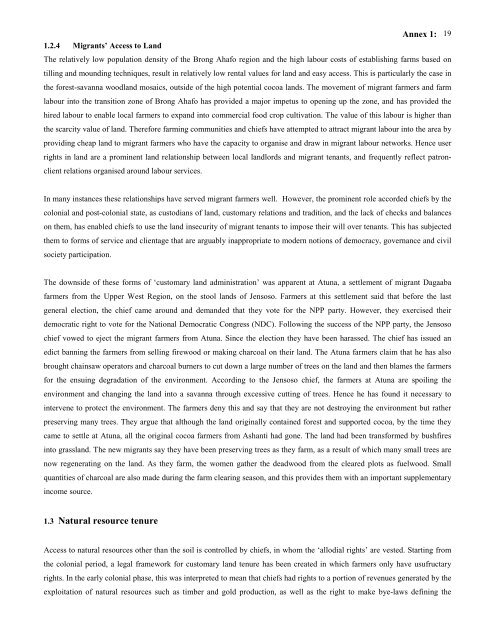Poverty Dimensions of Public Governance and Forest Management ...
Poverty Dimensions of Public Governance and Forest Management ...
Poverty Dimensions of Public Governance and Forest Management ...
Create successful ePaper yourself
Turn your PDF publications into a flip-book with our unique Google optimized e-Paper software.
Annex 1: 19<br />
1.2.4 Migrants’ Access to L<strong>and</strong><br />
The relatively low population density <strong>of</strong> the Brong Ahafo region <strong>and</strong> the high labour costs <strong>of</strong> establishing farms based on<br />
tilling <strong>and</strong> mounding techniques, result in relatively low rental values for l<strong>and</strong> <strong>and</strong> easy access. This is particularly the case in<br />
the forest-savanna woodl<strong>and</strong> mosaics, outside <strong>of</strong> the high potential cocoa l<strong>and</strong>s. The movement <strong>of</strong> migrant farmers <strong>and</strong> farm<br />
labour into the transition zone <strong>of</strong> Brong Ahafo has provided a major impetus to opening up the zone, <strong>and</strong> has provided the<br />
hired labour to enable local farmers to exp<strong>and</strong> into commercial food crop cultivation. The value <strong>of</strong> this labour is higher than<br />
the scarcity value <strong>of</strong> l<strong>and</strong>. Therefore farming communities <strong>and</strong> chiefs have attempted to attract migrant labour into the area by<br />
providing cheap l<strong>and</strong> to migrant farmers who have the capacity to organise <strong>and</strong> draw in migrant labour networks. Hence user<br />
rights in l<strong>and</strong> are a prominent l<strong>and</strong> relationship between local l<strong>and</strong>lords <strong>and</strong> migrant tenants, <strong>and</strong> frequently reflect patronclient<br />
relations organised around labour services.<br />
In many instances these relationships have served migrant farmers well. However, the prominent role accorded chiefs by the<br />
colonial <strong>and</strong> post-colonial state, as custodians <strong>of</strong> l<strong>and</strong>, customary relations <strong>and</strong> tradition, <strong>and</strong> the lack <strong>of</strong> checks <strong>and</strong> balances<br />
on them, has enabled chiefs to use the l<strong>and</strong> insecurity <strong>of</strong> migrant tenants to impose their will over tenants. This has subjected<br />
them to forms <strong>of</strong> service <strong>and</strong> clientage that are arguably inappropriate to modern notions <strong>of</strong> democracy, governance <strong>and</strong> civil<br />
society participation.<br />
The downside <strong>of</strong> these forms <strong>of</strong> ‘customary l<strong>and</strong> administration’ was apparent at Atuna, a settlement <strong>of</strong> migrant Dagaaba<br />
farmers from the Upper West Region, on the stool l<strong>and</strong>s <strong>of</strong> Jensoso. Farmers at this settlement said that before the last<br />
general election, the chief came around <strong>and</strong> dem<strong>and</strong>ed that they vote for the NPP party. However, they exercised their<br />
democratic right to vote for the National Democratic Congress (NDC). Following the success <strong>of</strong> the NPP party, the Jensoso<br />
chief vowed to eject the migrant farmers from Atuna. Since the election they have been harassed. The chief has issued an<br />
edict banning the farmers from selling firewood or making charcoal on their l<strong>and</strong>. The Atuna farmers claim that he has also<br />
brought chainsaw operators <strong>and</strong> charcoal burners to cut down a large number <strong>of</strong> trees on the l<strong>and</strong> <strong>and</strong> then blames the farmers<br />
for the ensuing degradation <strong>of</strong> the environment. According to the Jensoso chief, the farmers at Atuna are spoiling the<br />
environment <strong>and</strong> changing the l<strong>and</strong> into a savanna through excessive cutting <strong>of</strong> trees. Hence he has found it necessary to<br />
intervene to protect the environment. The farmers deny this <strong>and</strong> say that they are not destroying the environment but rather<br />
preserving many trees. They argue that although the l<strong>and</strong> originally contained forest <strong>and</strong> supported cocoa, by the time they<br />
came to settle at Atuna, all the original cocoa farmers from Ashanti had gone. The l<strong>and</strong> had been transformed by bushfires<br />
into grassl<strong>and</strong>. The new migrants say they have been preserving trees as they farm, as a result <strong>of</strong> which many small trees are<br />
now regenerating on the l<strong>and</strong>. As they farm, the women gather the deadwood from the cleared plots as fuelwood. Small<br />
quantities <strong>of</strong> charcoal are also made during the farm clearing season, <strong>and</strong> this provides them with an important supplementary<br />
income source.<br />
1.3 Natural resource tenure<br />
Access to natural resources other than the soil is controlled by chiefs, in whom the ‘allodial rights’ are vested. Starting from<br />
the colonial period, a legal framework for customary l<strong>and</strong> tenure has been created in which farmers only have usufructary<br />
rights. In the early colonial phase, this was interpreted to mean that chiefs had rights to a portion <strong>of</strong> revenues generated by the<br />
exploitation <strong>of</strong> natural resources such as timber <strong>and</strong> gold production, as well as the right to make bye-laws defining the
















